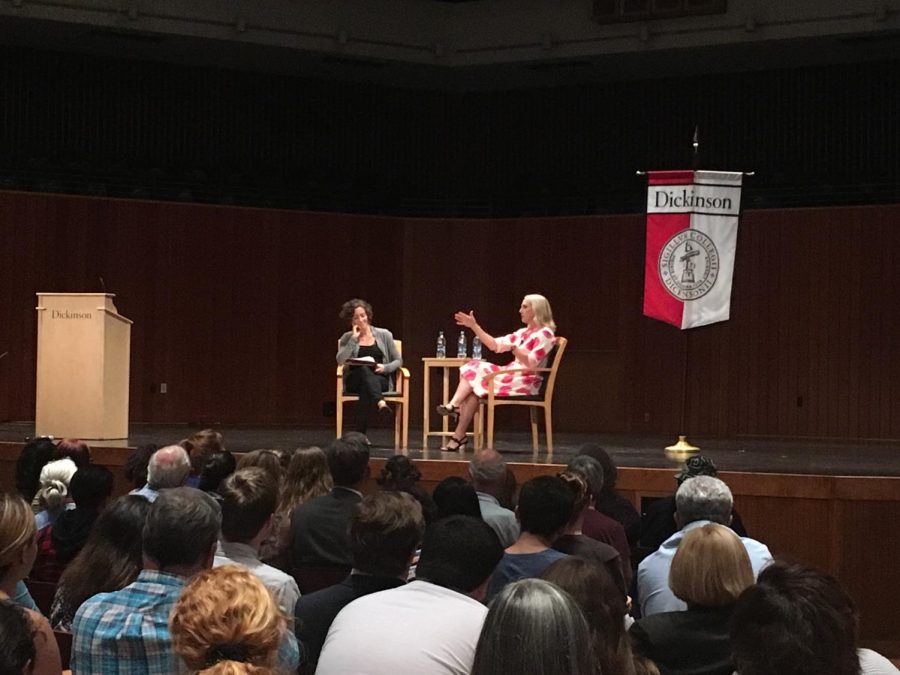Piper Kerman Talks Mass Incarceration, Inequality and Gender in Prisons
Piper Kerman, author of Orange is the New Black: My Year in a Women’s Prison and this year’s Poitras Gleim speaker, examined the mass incarceration system of the United States through her perspective as a formerly federally incarcerated prisoner.
Before Kerman took the stage, Katie Oliviero, assistant professor of women’s gender and sexuality studies asked attendees to raise their hands if they had seen Orange is the New Black, the Netflix show based on Kerman’s memoir, which started in 2013 and now has six seasons. Nearly all 300 audience members raised their hands. Oliviero next asked who had read Kerman’s book, which was released in 2010. Fewer, but still many of the attendees, kept their hands raised.
Oliviero conducted the interview of Kerman, who spoke first about her pathway from Smith College, her alma mater from 1992, to Danbury Federal Correctional Institution, where Kerman served 13 months of a 15-month sentence beginning in 2004.
Kerman discussed her crime, which was carrying a suitcase of drug money on an international flight in 1993. She was indicted in federal court in 1998 for money laundering and drug trafficking, to which she pleaded guilty.
Kerman called all prison stories “survival stories” but specifically qualified hers as a “fish-out-of-water” story, owing to her coming from a middle-class, white family.
“We don’t really build our prisons and jails to hold middle-class people and upper-middle-class people,” Kerman stated in an interview with The Dickinsonian, the full text of which can be read on page 3. “We vastly and disproportionately punish poor people, and significantly and disproportionately poor people of color. So statically, the likelihood of an upper middle class white woman ending up in prison is very slim.”
Several other of Oliviero’s questions focused on Kerman’s memoir, specifically the portions about Vanessa, the transgender woman who was in the same prison as Kerman during parts of her sentence. Vanessa is Sophie in the show, but neither is her real name. Oliviero then asked about the relationship of the memoir to the hit Netflix show.
On her writing of the book, Kerman said she “felt like people were interested.”
“I had witnessed a great injustice,” she said, calling the incarceration of many women she encountered in prison “pointless” and “wasteful.”
She claims that she did not know what to contribute to combat the system she has been a part of. But, she said, “I could contribute the story.”
“I wrote the book that I was capable of writing,” Kerman said.
Kerman said in particular that the response of the prison community to Vanessa’s presence in the prison was “inspiring.”
This led to a discussion of some of the themes portrayed by both the memoir and the show, such as race, class, gender and power. Kerman qualified the federal incarceration institution “hierarchal” and “patriarchal.”
Another one of Oliverio’s questions prodded specifically into the prison experience, asking Kerman what she learned during her sentence.
During her response, Kerman stressed the experience of a female in prison, claiming prisons were built to house men, not women. She cited the rise from 500,000 women in prison in 1980 to 2.3 million now to show the rise in incarceration for women and girls, specifically for low-level offenses.
After 45 minutes of the standard interview-style lecture, the crowd was permitted to ask questions of Kerman. Per Dickinson’s policy, students were given the opportunity to ask questions first, however due to time constraints, all three questions were asked by students.
The first question asked Kerman to elaborate on her claim that prisons are systems for men that women are “put in to.”
Kerman recalled wearing men’s uniforms and underwear during her time in Danbury. She also discussed the limited medical services for women and brought up that women are often far away from their families while incarcerated. She said that in her experience, most of the correctional officers were men, and that there was a situation of inequality that lead to violence for many women.
The following attendee redirected the discussion to Kerman’s memoir. She asked how the people who Kerman portrayed in her book felt about their respective portrayals.
According to Kerman, there was a “good response” to the book. “It’s been positive,” she said, “with one snippy response.” She stated that there have been more “mixed emotions” about the show and the portrayals therein.
The final question was about Kerman’s writing process. Kerman shared that she did not write while in prison, and that it took about two and a half years to finish the memoir.
Julien Herpers ’19, director of academics of Student Senate, who introduced Kerman at the start of the lecture, said “The Poitras Gleim had a great turnout and we were very honored to work with Piper. It was wonderful seeing students engage with the author both during the Q&A session and during the book signing. I look forward to notifying Mrs. Poitras ’53 of the success of the event in the coming days.”
“I thought the talk was really insightful,” said Caitlin Filiato ’19, who attended the lecture. “Although it isn’t an issue that has directly impacted me, it brought up a lot of things I never thought to consider like women’s health and educational programs for prisoners. It is one thing to see individuals’ stories portrayed on the TV show but was eye-opening to see her talk in person and hear those experiences firsthand.”
According to the Dickinson College webpage on lectures and symposia, the annual Poitras Gleim Lecture was a gift endowed by Ted and Kay Gleim Poitras ’53. Its intention is to foster “cross-disciplinary thought and communication” by creating a forum where a speaker could discuss various academic and political issues.
The Poitras Gleim Lecture took place on Sept. 21 at 7 p.m. in the Anita Tuvin Schlecter auditorium. It was listed as part of the official schedule for Homecoming weekend.




